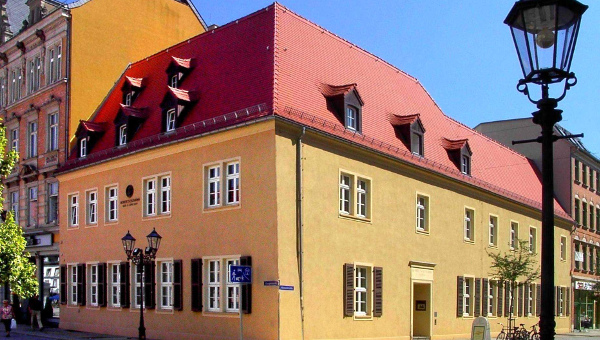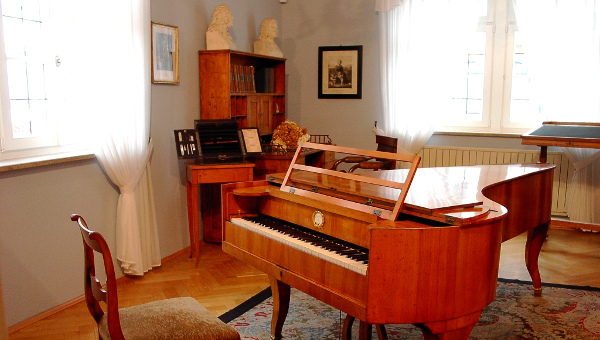



Hauptmarkt 5
08056 Zwickau
Telefon +49.375.834406 (Museumskasse)
oder +49.375.834401
Web: www.schumann-zwickau.de
E-Mail: schumannhaus@zwickau.de
Dienstag bis Freitag:
10.00–17.00 Uhr
Samstag und Sonntag:
13.00–17.00 Uhr
Das Eckhaus am Hauptmarkt 5 beherbergt hinter seiner rekonstruierten Fassade die weltweit größte Schumann-Sammlung mit mehr als 4000 Originalhandschriften Robert Schumanns (1810–1856) und seiner Gattin, der Pianistin Clara geb. Wieck (1819–1896). Vater August Schumann, der als Erfinder des Taschenbuchs erfolgreich wurde, hatte in diesem Haus eine Buch- und Verlagshandlung. Ein Großteil seines Verlagsbestandes ist in den Ausstellungsräumen zu bewundern. Die insgesamt acht Räume umfassende Dauerausstellung zeigt wertvolle Bilder, Musikinstrumente, Drucke, Handschriften und Erinnerungsstücke. Das Geburtszimmer Robert Schumanns ist heute als Gedenkzimmer komplett mit historischem Mobiliar aus dem Besitz Robert und Clara Schumanns ausgestattet, darunter als besonderes Prunkstück der Wiener Stein-Flügel, auf dem Clara Schumann neunjährig 1828 ihr Konzertdebüt im Leipziger Gewandhaus gab. Führungen sind in fünf Sprachen möglich, es gibt auch Führungsangebote zu besonderen Themen und speziell für Kindergruppen. Das Foyer im Erdgeschoss präsentiert wechselnde Sonderausstellungen, außerdem befinden sich dort der Museums-Shop und ein Kammermusiksaal mit 140 Plätzen für Konzerte, Vortragsabende und Symposien.
Deutschland verfügt über musikalische Traditionen und Nachlässe von außerordentlichem Wert: Händel, Schütz und Bach, Beethoven, Mendelssohn, Schumann, Brahms und Wagner sind - um nur einige Namen zu nennen - weltweit bekannte und geschätzte Komponisten. Ihr Wirken hat eine einzigartige Musiklandschaft wesentlich mitgeformt.
Zahlreiche Orchester, Chöre und Ensembles, renommierte Musikfestivals und -reihen, Musikerhäuser mit Museen, öffentliche Archive und Bibliotheken, aber auch private Sammlungen bewahren ihr musikalisches Erbe.
Diesen unschätzbaren Fundus gilt es immer wieder neu zu beleben und für die Gegenwart zu erschließen. Den in der Arbeitsgemeinschaft Musikermuseen Deutschlands zuusammengeschlossenen Häusern kommt dabei eine wichtige Rolle zu. In ihnen begegnen wir dem Werk von Musikern und Komponisten, die die Kulturnation Deutschland außerordentlich bereichert haben. Über das individuelle Portrait, über die Vermittlung des einzelnen Œuvres hinaus tragen die Musikermuseen aber auch zur Pflege musikalischer Tradition insgesamt bei. Die vorliegende Broschüre unterstreicht diesen Aspekt der Zusammenschau, und sie lädt zu einer Reise in die Musikgeschichte Deutschlands ein. Ich wünsche diesem Reiseführer regen Gebrauch und eine große Resonanz.
Bernd Neumann, MdB
Staatsminister bei der Bundeskanzlerin
Der Beauftragte der Bundesregierung für Kultur und Medien
Zitat: Vorwort zur Broschüre der Arbeitsgemeinschaft "Musikermuseen in Deutschland", 2007.